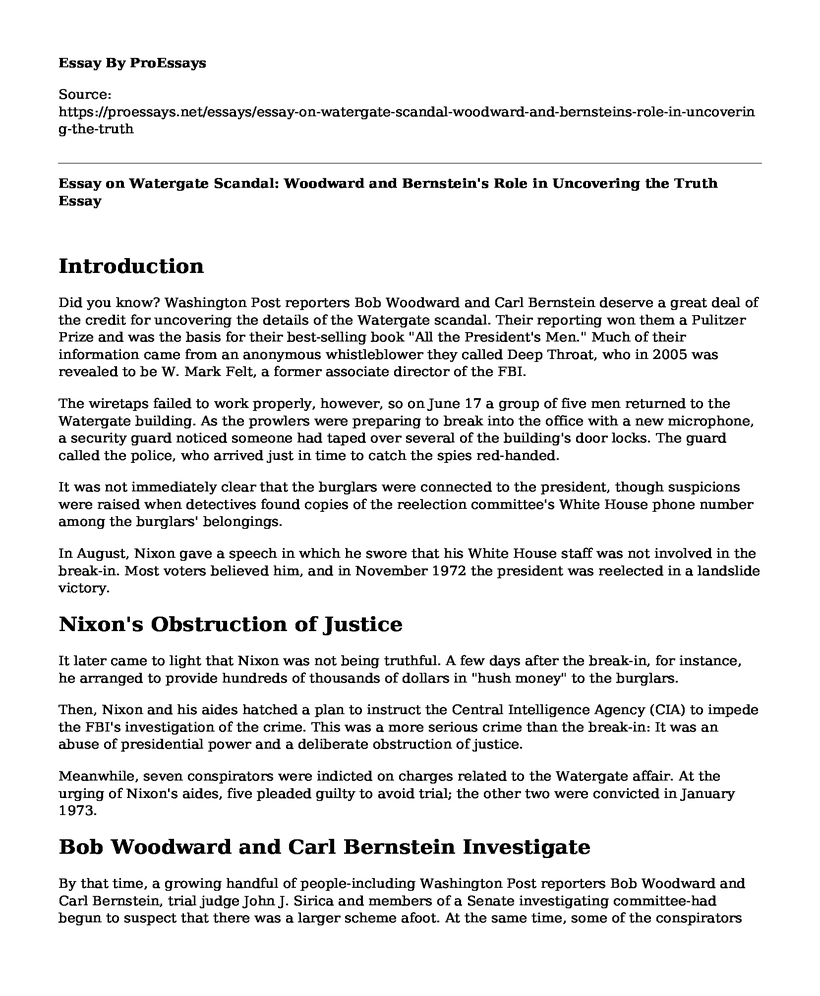Introduction
Did you know? Washington Post reporters Bob Woodward and Carl Bernstein deserve a great deal of the credit for uncovering the details of the Watergate scandal. Their reporting won them a Pulitzer Prize and was the basis for their best-selling book "All the President's Men." Much of their information came from an anonymous whistleblower they called Deep Throat, who in 2005 was revealed to be W. Mark Felt, a former associate director of the FBI.
The wiretaps failed to work properly, however, so on June 17 a group of five men returned to the Watergate building. As the prowlers were preparing to break into the office with a new microphone, a security guard noticed someone had taped over several of the building's door locks. The guard called the police, who arrived just in time to catch the spies red-handed.
It was not immediately clear that the burglars were connected to the president, though suspicions were raised when detectives found copies of the reelection committee's White House phone number among the burglars' belongings.
In August, Nixon gave a speech in which he swore that his White House staff was not involved in the break-in. Most voters believed him, and in November 1972 the president was reelected in a landslide victory.
Nixon's Obstruction of Justice
It later came to light that Nixon was not being truthful. A few days after the break-in, for instance, he arranged to provide hundreds of thousands of dollars in "hush money" to the burglars.
Then, Nixon and his aides hatched a plan to instruct the Central Intelligence Agency (CIA) to impede the FBI's investigation of the crime. This was a more serious crime than the break-in: It was an abuse of presidential power and a deliberate obstruction of justice.
Meanwhile, seven conspirators were indicted on charges related to the Watergate affair. At the urging of Nixon's aides, five pleaded guilty to avoid trial; the other two were convicted in January 1973.
Bob Woodward and Carl Bernstein Investigate
By that time, a growing handful of people-including Washington Post reporters Bob Woodward and Carl Bernstein, trial judge John J. Sirica and members of a Senate investigating committee-had begun to suspect that there was a larger scheme afoot. At the same time, some of the conspirators began to crack under the pressure of the cover-up.
A handful of Nixon's aides, including White House counsel John Dean, testified before a grand jury about the president's crimes; they also testified that Nixon had secretly taped every conversation that took place in the Oval Office. If prosecutors could get their hands on those tapes, they would have proof of the president's guilt.
Nixon struggled to protect the tapes during the summer and fall of 1973. His lawyers argued that the president's executive privilege allowed him to keep the tapes to himself, but Judge Sirica, the Senate committee and an independent special prosecutor named Archibald Cox were all determined to obtain them.
The Saturday Night Massacre
When Cox refused to stop demanding the tapes, Nixon ordered that he be fired, leading several Justice Department officials to resign in protest. (These events, which took place on October 20, 1973, are known as the Saturday Night Massacre.) Eventually, Nixon agreed to surrender some-but not all-of the tapes.
Early in 1974, the cover-up and efforts to impede the Watergate investigation began to unravel. On March 1, a grand jury appointed by a new special prosecutor indicted seven of Nixon's former aides on various charges related to the Watergate affair. The jury, unsure if they could indict a sitting president, called Nixon an "unindicted co-conspirator."
In July, the Supreme Court ordered Nixon to turn over the tapes. While the president dragged his feet, the House of Representatives voted to HYPERLINK "http://www.history.com/topics/impeachment-in-us-history" impeachNixon for obstruction of justice, abuse of power, criminal cover-up and several violations of the Constitution.
Nixon Resigns
Finally, on August 5, Nixon released the tapes, which provided undeniable evidence of his complicity in the Watergate crimes. In the face of almost certain impeachment by Congress, Nixon resigned in disgrace on August 8, and left office the following day.
Six weeks later, after Vice President Gerald Ford was sworn in as president, he pardoned Nixon for any crimes he had committed while in office. Some of Nixon's aides were not so lucky: They were convicted of very serious offenses and sent to federal prison. Nixon himself never admitted to any criminal wrongdoing, though he did acknowledge using poor judgment.
His abuse of presidential power had a long-lasting effect on American political life, creating an atmosphere of cynicism and distrust. While many Americans had been deeply dismayed by the outcome of the Vietnam War, and saddened by the assassinations of Robert F. Kennedy, Martin Luther King and other leaders, Watergate added further disappointment to a national climate already soured by the difficulties and losses of the previous decade.
Cite this page
Essay on Watergate Scandal: Woodward and Bernstein's Role in Uncovering the Truth. (2022, Dec 29). Retrieved from https://proessays.net/essays/essay-on-watergate-scandal-woodward-and-bernsteins-role-in-uncovering-the-truth
If you are the original author of this essay and no longer wish to have it published on the ProEssays website, please click below to request its removal:
- Teachers Pay and Performance-Based Policies Essay Example
- Essay Sample on Rising Federal Deficit and National Debt
- Essay Sample on U.S. Economy: Government Intervention vs. Laissez-Faire
- Essay on the Balance Between Freedom & Governance: A Necessity for Society
- Essay Sample on Hitler as Savior: Mjolnir's 1932 German Election Poster
- Essay Example on Government Health Insurance Programs: Coverage & Eligibility
- Strategic Training: Key to Instilling Healthcare Policies and Procedures - Report Sample







